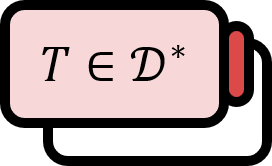Test Functions and Test Function Space
Definition1
Let an open set $\Omega \subset \mathbb{R}^{n}$ and a function $\phi : \Omega \to \mathbb{C}$ be given. If $\phi$ is infinitely differentiable, and all its derivatives are continuous and have a compact support, it is called a test function. The function space of test functions is denoted by $C_{c}^{\infty}(\Omega)$ or simply as $\mathcal{D}(\Omega)$.
Explanation
It is also called a test function or testing function. The reason $\phi$ is named a test function is not that we want to deal with $\phi$ itself, but because we intend to define some other function and study its properties using $\phi$. Specifically, test functions are used to rigorously define functions with mathematical ambiguities such as the Dirac delta function. An example of a test function is a mollifier.
Theorem2
If $\phi$ is a test function, then its derivative is also a test function.
$$ \phi \in \mathcal{D}(\Omega) \implies \frac{ \partial \phi}{ \partial x_{i}} \in \mathcal{D}(\Omega) (i=1,\cdots,n) $$
In this case, $x=(x_{1},\cdots,x_{n})\in \mathbb{R}^{n}$.
Proof
It is trivial that $\dfrac{ \partial \phi}{ \partial x_{i}} \in C^{\infty}$ by the definition of the test function. Let’s assume $x_{0} \notin \mathrm{supp} \phi$. Then $x_{0} \in \left( \mathrm{supp} \phi \right)^{c}$, and since the support is a closed set, $(\mathrm{supp} \phi)^{c}$ is open. Therefore, there exists some neighborhood $N_{x_{0}}$ that contains $x_{0}$, according to the definition of an open set. Also, by the definition of support, $\phi=0$ on $N_{x_{0}}$, and naturally $\dfrac{ \partial \phi}{ \partial x_{i}}=0$. This implies $x_{0} \notin \mathrm{supp} \dfrac{ \partial \phi}{ \partial x_{i}}$. Hence, the following holds:
$$ \mathrm{supp} \frac{ \partial \phi}{ \partial x_{i} } \subset \mathrm{supp} \phi $$
Since a closed subset of a compact set is compact, $\mathrm{supp} \dfrac{ \partial \phi}{ \partial x_{i}}$ is compact.
■
Corollary
Let us assume $\phi,\phi_{1},\phi_{2} \in \mathcal{D}(\mathbb{R}^{n})$, $x_{0}\in \mathbb{R}^{n}$, $a \in \mathbb{R}\setminus \left\{ 0 \right\}$, $\psi \in C^{\infty}(\mathbb{R}^{n})$. Then the following holds:
(a) $\phi (x-x_{0})$, $\phi (-x)$, $\phi (ax)\in \mathcal{D}(\mathbb{R}^{n})$
(b) $\psi \phi \in \mathcal{D}(\mathbb{R}^{n})$
(c) $\phi_{1} * \phi_{2} \in \mathcal{D}$
The proof is omitted as it is obvious.
